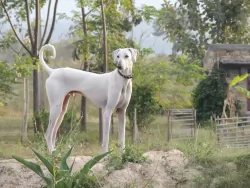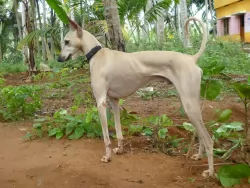 MyDogBreeds
MyDogBreeds Greek Sheepdog is originated from Greece but Chippiparai is originated from India. Greek Sheepdog may grow 12 cm / 5 inches higher than Chippiparai. Greek Sheepdog may weigh 30 kg / 67 pounds more than Chippiparai. Greek Sheepdog may live 3 years less than Chippiparai. Both Greek Sheepdog and Chippiparai has same litter size. Greek Sheepdog requires Moderate maintenance. But Chippiparai requires Low maintenance
Greek Sheepdog is originated from Greece but Chippiparai is originated from India. Greek Sheepdog may grow 12 cm / 5 inches higher than Chippiparai. Greek Sheepdog may weigh 30 kg / 67 pounds more than Chippiparai. Greek Sheepdog may live 3 years less than Chippiparai. Both Greek Sheepdog and Chippiparai has same litter size. Greek Sheepdog requires Moderate maintenance. But Chippiparai requires Low maintenance
 Known as the Olympus Dog or even simply as the Greek Shepherd, the Greek Sheepdog is a large to giant molosser dog from Greece. His purpose has always been to guard flocks and livestock from predators and he has been around for hundreds of years, looking much like the Great Pyrenees.
Known as the Olympus Dog or even simply as the Greek Shepherd, the Greek Sheepdog is a large to giant molosser dog from Greece. His purpose has always been to guard flocks and livestock from predators and he has been around for hundreds of years, looking much like the Great Pyrenees.
It is believed that the dog was likely bred with a number of breeds – both local and non-local dogs.
Unfortunately there were no records kept of the development of the breed but today the Greek Sheepdog remains a rare and fairly unknown breed outside of Greece.
It's numbers are dwindling in Greece too and since 1998 the Greek ARCTUROS has made attempts to save the breed, starting the Greek Shepherd Dog Breeding Program.
 The Chippiparai is a working dog found in India and until recently there has been little interest in the purity of any breed, but rather only an emphasis on the abilities of the dog. They are only beginning to research the origin and history of their native dogs such as the Chippiparai. Not much is known about the origin of the breed except that it is found almost exclusively in Tamil Nadu and Keraia in the southern part of the subcontinent of India. Other than this there is much speculation about the breed’s origin but very little-known facts. It is indeed an ancient breed; however, its origin could be thousands of years ago or simply hundreds of years ago.
The Chippiparai is a working dog found in India and until recently there has been little interest in the purity of any breed, but rather only an emphasis on the abilities of the dog. They are only beginning to research the origin and history of their native dogs such as the Chippiparai. Not much is known about the origin of the breed except that it is found almost exclusively in Tamil Nadu and Keraia in the southern part of the subcontinent of India. Other than this there is much speculation about the breed’s origin but very little-known facts. It is indeed an ancient breed; however, its origin could be thousands of years ago or simply hundreds of years ago.
• Perhaps it is a descendant of the Saluki as it resembles this breed quite a bit. It has been believed for some time that the Saluki is the original sighthound and the source of all sighthound breeds. The Saluki was very popular in the Middle East, especially in Persia and Arabia from which it could easily have spread to India. It would then have been shared from Northern India to Southern India where the Chippiparai is found.
• Perhaps the Chippiparai is a descendent of sighthounds from Central Asia and Afghanistan – the Tazi, Taigan, Hortaya Borsaya or the Afghan Hound. This part of Central Asia had more trade, influence and contact with the Indian subcontinent early in their history than with any other region. The Chippiparai is considered by some to be more like these sighthounds than like the Saluki and the interaction between these regions has a much longer history than the Middle East and India.
• It is also speculated that the Chippiparai might have been developed completely and uniquely from the local street and working dogs. With the civilization of India being one of the oldest in the world, it is considered a possibility that the Chippiparai is the descendent of the Harappan hunting dogs that probably were developed by the Indus Valley or Harappa roiling class.
Wherever the Chippiparai came from, they were the exclusive property of the wealthy and ruling castes. These upper castes were the only ones that could legally hunt with dogs or afford to feed one. The royal classes of Tiruneivell, Thanjavur, and Madurai all fed the popularity of the breed among the upper castes. They were coursing dogs used to chase down the prey once it was sighted. The Chippiparai are incredibly fast runners and would catch almost any prey and either hold it or kill it for their hunter. The Chippiparai, when not hunting, had to be chained so they would not chase any small animal that they saw. This confinement also added to the purity of the breed as random breeding was prevented.
The southern part of the Indian subcontinent is extremely hot with routine temperatures over 100’. The Chippiparai was developed to withstand these extreme temperatures and is more heat tolerant than most any other breed. They also need very little food and are resistant to the many parasites and diseases found in southern India.
Harboring the belief that Indian dogs were not as good as European ones, the occupying countries of Portugal, France, and Britain, had no interest in the Chippiparai, again leaving the breed to develop naturally on their own with little or no interbreeding. They also received no formal recognition because Indian culture only valued the dog for its working abilities. There was no Indian Kennel Club until 1956.
The Chippiparai is now very rarely and only found in the area of its birth. Many believe the breed is in danger of becoming extinct and even though it is now registered with Indian Kennel Clubs it is not often shown in their dog shows. Lovers of the breed are now attempting to get Indians to recognize that the Chippiparai is a great companion animal and attempting to save the breed.
 The Greek Sheepdog is a large dog, standing at 65 – 75cm and weighing roughly between 32 to 50kg. He is a dog that displays physical strength. He has a large head with brown eyes and a serious expression on his face. He has a thick double coat which is essentially white with red, black or brown markings.
The Greek Sheepdog is a large dog, standing at 65 – 75cm and weighing roughly between 32 to 50kg. He is a dog that displays physical strength. He has a large head with brown eyes and a serious expression on his face. He has a thick double coat which is essentially white with red, black or brown markings.
You will also see tri-color dogs. He has floppy ears today but there was a time when the right ear of the male dog was cut off or cropped. The tail is long and bushy and it can be held low but also held up so that it curls over the back.
Maybe because of his size and him being a strong-willed, independent thinker, the Greek Shepherd may not be the best choice for a first time dog owner. Having said that, if you're a strong, firm, patient, kind person, then you'll be able to raise any kind of dog, first time or not.
The Greek Shepherd is a brave, loyal, calm, protective dog and with socialization and training, can make an awesome pet. They are dogs who are a bit suspicious with strangers, not making friends too easily. He loves his human family and wants to be part of their activities. He can't be left on his own day after day as this can lead to excessive barking and destructive behavior.
They've been dogs used to working with livestock and they will certainly need to be taken on daily walks and involved in rough and tumble games as they thrive on activity. The dog won't fit easily into city life where there is just a handkerchief-sized garden as he needs space and activity.
 The Chippiparai is a typical sighthound although their size and appearance will vary more than that of registered purebred sighthounds. Typically, they will have a long, domed head with small erect ears and dark eyes. Their muzzle will be as deep and wide as the skull but longer. Their legs are straight and long, their chest is roached back and deep, giving them, an appearance very similar to a greyhound or other sighthound.
The Chippiparai is a typical sighthound although their size and appearance will vary more than that of registered purebred sighthounds. Typically, they will have a long, domed head with small erect ears and dark eyes. Their muzzle will be as deep and wide as the skull but longer. Their legs are straight and long, their chest is roached back and deep, giving them, an appearance very similar to a greyhound or other sighthound.
They have a long curly tail, and their coat can vary greatly in color. They are medium sized, and their coat is short, shiny and close. He is very slender and sleek, which along with his long legs gives him that incredible speed. They are thin with visible ribs.
 Your Greek Shepherd is an intelligent, independent dog who likes to show his loyalty and devotion to his owner.
Your Greek Shepherd is an intelligent, independent dog who likes to show his loyalty and devotion to his owner.
He is a protective dog too and when trained and socialized makes an excellent family pet. These Molosser type dogs are formidable dogs known for their bravery and courage.
They're the type of dogs who like a strong leader-type of owner and when he gets someone who he can look up to as his leader, he becomes a loyal, devoted pet.
 The Chippiparai is a loving, gentle family dog if well socialized, well trained and well exercised. They are very intelligent and need human companionship. Once they are living with a human family, they are very protective of that family. They are for the most part peaceful and quiet dogs. They are loyal and loving but they are not overly affectionate. Cuddlers they are not, and they do not like to play rough with children.
The Chippiparai is a loving, gentle family dog if well socialized, well trained and well exercised. They are very intelligent and need human companionship. Once they are living with a human family, they are very protective of that family. They are for the most part peaceful and quiet dogs. They are loyal and loving but they are not overly affectionate. Cuddlers they are not, and they do not like to play rough with children.
Accepting and loving within the family, the Chippiparai are equally hesitant and shy around strangers. They can be suspicious, but they are not aggressive. They are just very aloof with strangers, yet they hardly ever bark.
 With good care and lots of love, this dog can live to be between 10 to 12 years of age. He is unlikely to get sick very often, but still it it wise to know of some of the health issues than can occur with large breed dogs like this.
With good care and lots of love, this dog can live to be between 10 to 12 years of age. He is unlikely to get sick very often, but still it it wise to know of some of the health issues than can occur with large breed dogs like this.
This is a disease of the heart muscle. The heart is enlarged and unable to have the right heart rhythm. The distended muscle isn't able to push the blood through the heart chambers to where it is needed. Cause for this dilated heart can be genetic, nutritional, infectious or metabolic.
Because taurine and carnitine are involved in good heart function, and low levels of these amino acids can cause symptoms of dilated cardiomyopathy, supplementation is useful, especially if you feel your dog isn't getting in the right kind of food.
Borreliosis, a bacterial infection, causes Lyme disease, transmitted by the Ixodes tick. The tick bites the dog and the toxins gets into the dog's bloodstream, with the bacteria travelling to different parts of the body.
Typical symptoms in a dog includes loss of appetite, fever, no energy, swelling of joints and lameness, but symptoms can progress to kidney failure too or cardiac problems. Treatment will include antibiotics.
 There are no clinical studies regarding the health and health history of the Chippiparai, so little is known about their long-term health. However, most who know the breed, believe it is an incredibly healthy one. They seem to have a lot less genetically transmitted health issues than other purebreds. Because of their isolation for centuries in India, they have developed immunities and resistance to most parasites and diseases other dog suffer from.
There are no clinical studies regarding the health and health history of the Chippiparai, so little is known about their long-term health. However, most who know the breed, believe it is an incredibly healthy one. They seem to have a lot less genetically transmitted health issues than other purebreds. Because of their isolation for centuries in India, they have developed immunities and resistance to most parasites and diseases other dog suffer from.
Because of this you should look for the types of issues that occur in dogs of this size and build. Have them tested by the Canine Eye Registration Foundation and the Orthopedic Foundation for Animals.
 The coat of the Greek Shepherd is fairly long so it will need to be brushed at least twice a week to keep it free from matting and tangling. He is an average shedder and the brushing will remove all loose hairs, keeping the coat sleek and shiny.
The coat of the Greek Shepherd is fairly long so it will need to be brushed at least twice a week to keep it free from matting and tangling. He is an average shedder and the brushing will remove all loose hairs, keeping the coat sleek and shiny.
Feeding your Greek Sheepdog requires giving him top quality food as this will ensure he is healthy and can ward off common dog illnesses. If you're going to be feeding him kibble, make sure to go for the top quality brands, and as a treat for your pet you can add in some brown rice, pasta, brown bread, cooked chicken and vegetables.
Dogs are essentially carnivores and he will need to have some raw meat such as beef added into his kibble from time to time. He should never ever be without a constant supply of fresh, cool water.
 Do not overfeed your Chippiparai. Feed twice a day and no more than a total of 2.5 cups of high quality dry food.
Do not overfeed your Chippiparai. Feed twice a day and no more than a total of 2.5 cups of high quality dry food.
As mentioned previously the Chippiparai seems to have no genetic diseases or issues and very few acquired ones. However, he is sensitive to anesthesia and some foods. He is intolerant to cold weather and has a hard time with his pads on hard surfaces. Some Chippiparai might experience some of the ailments other breeds like them experience.
Both Elbow and hip are possible. This can cause arthritis and lameness. This occurs when the bone does not fit well into the joint.
This can cause lameness as well. The kneecaps slide over the knee instead of staying in place.
This is a hunting dog and he will want to hunt. They are incredibly fast and need the opportunity to run. Brisk walks will not be enough for this dog. He is very energetic. They will chase any small animals. It is not recommended that you have small pets even small dogs or cats with a Chippiparai. Having been bred for centuries to hunt, they are not likely to respond to any commands if they are off lease and chasing prey. Do not allow them to be off leash unless in a fenced area, and that fence needs to be 8 feet tall as they can easily jump a seven-foot fence. Try they at coursing, agility, fly ball and frisbee competitions.